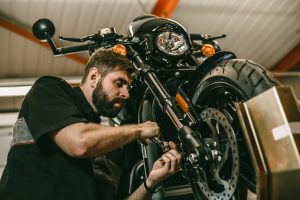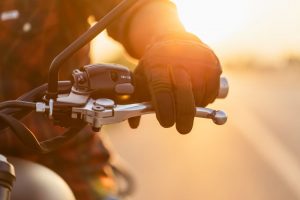While motorcycle riders will tell you that riding a bike is one of the most enjoyable forms of travel, many riders also know that motorcycle riding also comes with substantial risks of being involved in an accident. Operating a motorcycle takes a great deal of skill, and riders often face difficulty from other drivers who do not safely share the road with motorcycles. But there are tips you can follow to help prevent or reduce your chance of being injured in a motorcycle crash.
Practice with Your Bike
 One of the best ways to prevent yourself from being in a motorcycle accident includes practicing with your motorcycle. You should never ride on the road with a motorcycle whose performance exceeds your experience and skill level. After obtaining a new motorcycle, you should practice with the bike in a safe, controlled area such as an empty parking lot. If you take extended time off from motorcycle riding (such as during the winter), you may also want to consider practicing and getting reacquainted with your bike’s performance at the start of the riding season.
One of the best ways to prevent yourself from being in a motorcycle accident includes practicing with your motorcycle. You should never ride on the road with a motorcycle whose performance exceeds your experience and skill level. After obtaining a new motorcycle, you should practice with the bike in a safe, controlled area such as an empty parking lot. If you take extended time off from motorcycle riding (such as during the winter), you may also want to consider practicing and getting reacquainted with your bike’s performance at the start of the riding season.
If you are just getting into motorcycle riding, you should also consider taking motorcycle safety courses to help build up your skill and experience on motorcycles.
Maintain Your Bike
You can also help reduce your risk of getting into an accident on your motorcycle by keeping up with maintenance. Make sure to perform all necessary and manufacturer-recommended maintenance for your motorcycle.
Every time you get on your bike, you should also do a quick check to make sure that the important components of your motorcycle are still working. This includes the headlight, the taillight and turn signals, the brakes, and the horn. You should also regularly check your motorcycle’s fluid levels, including engine oil and coolant. Proper maintenance will help you avoid a breakdown or mechanical failure that can lead to an accident while your motorcycle is moving.
Ride Defensively
Another important way to help avoid getting into a crash on your motorcycle involves practicing defensive riding. Defensive riding includes constantly scanning the road around and ahead of you for possible hazards, acting as though other drivers on the road do not see you, and always having an “out” or actions you will take if you are suddenly confronted with a hazard or emergency.
Defensive riding practices also include making yourself as visible as possible, such as by wearing high-visibility colors in your clothing and always having your headlight on, even in broad daylight. Defensive riding also includes adjusting your riding to factors like road conditions, weather, or the curve of the road. Finally, you should always ride within your skill limits. Do not feel pressure to speed up to keep up with other motorcycle riders or with general traffic.
Don’t Drink and Ride
 You should never get on a motorcycle after having consumed alcohol or drugs. Safe motorcycle riding requires a rider’s full concentration and physical effort. Intoxication by alcohol or drugs affects motor coordination, reaction times, perception, and judgment, making operating a motorcycle harder than it already is. Riding under the influence of alcohol or drugs can make it more difficult to stay balanced on your motorcycle or to notice or react to hazards or emergencies that may occur seemingly out of nowhere.
You should never get on a motorcycle after having consumed alcohol or drugs. Safe motorcycle riding requires a rider’s full concentration and physical effort. Intoxication by alcohol or drugs affects motor coordination, reaction times, perception, and judgment, making operating a motorcycle harder than it already is. Riding under the influence of alcohol or drugs can make it more difficult to stay balanced on your motorcycle or to notice or react to hazards or emergencies that may occur seemingly out of nowhere.
Avoid Riding While Tired or Fatigued
Finally, you should also avoid riding if you start to feel or if you are already feeling drowsy, fatigued, or tired. Tiredness and fatigue can have many of the same impacts on your physical and cognitive abilities that alcohol or drugs can have. If you begin to feel fatigued or tired while riding, pull off the road into a parking lot or rest stop as soon as possible and take a break. Regular stops on long road trips to take a walk or have some food and water can help avoid the onset of tiredness or fatigue.
You should also avoid riding on a motorcycle at night whenever possible. Not only are you more likely to feel drowsy or fatigued at night, but nighttime also makes you less visible to other drivers than motorcycles already are.
Contact Hankey Marks & Crider If You Have Been Injured in a Motorcycle Accident
When you have been hurt in a motorcycle crash that occurred due to no fault of your own, call Hankey Marks & Crider at (317) 634-8565 or fill out our website’s contact form for a free, no-obligation case evaluation to speak with our Indianapolis motorcycle accident attorneys about your legal rights and options. We can guide you through what to expect in the claims process and discuss how our legal team will assist you with pursuing the financial recovery you need.

